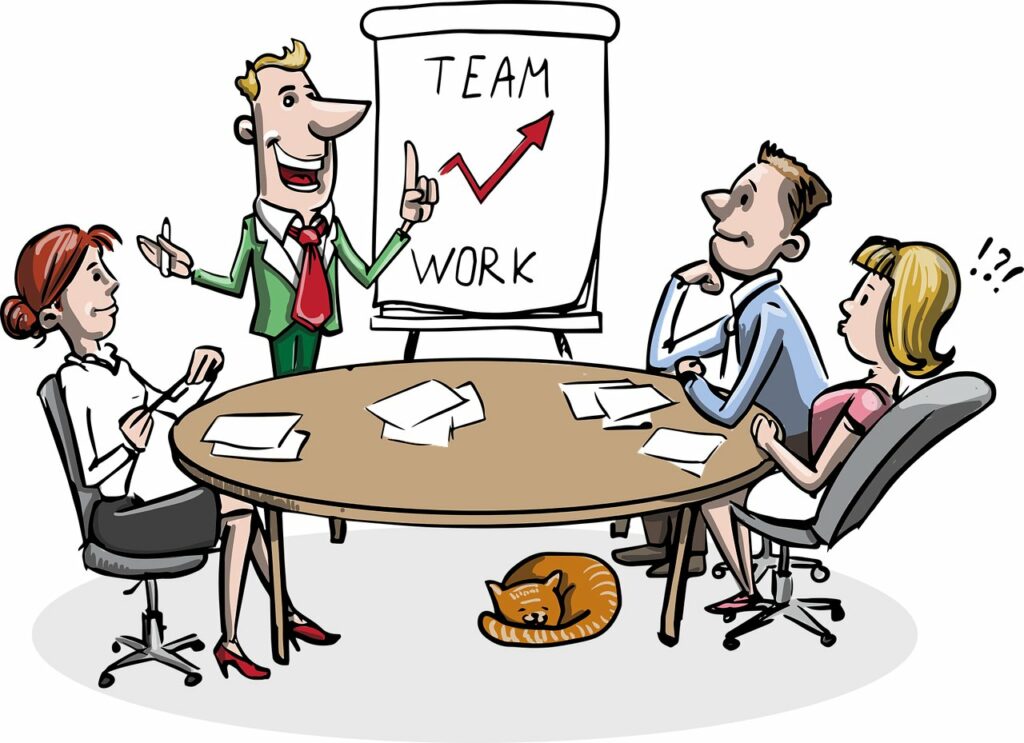How to Manage and Resolve Conflict in the Workplace

In today’s dynamic and interconnected business landscape, effective conflict resolution in the workplace is not just a desirable skill; it’s an essential one.
As a small business owner in the United States, you understand that the success of your enterprise depends not only on your products or services but also on your team’s collaborative efforts.
However, there are bound to be disagreements and conflicts where there are people.
The road to achieving a harmonious and productive work environment begins with understanding the nature of workplace conflict, the underlying cause of the conflict, and the tangible benefits of addressing it proactively.
Top two software solutions you can utilize to resolve conflicts in the workplace:
1. Communication and Collaboration Tools: Utilizing communication and collaboration software like Slack or Microsoft Teams can help mitigate employee conflicts. These platforms facilitate real-time discussions, reducing misunderstandings and allowing team members to address conflict issues promptly.
Additionally, the transparency of communication in these tools helps track the evolution of conflicts, making it easier for management to step in when necessary and preemptively resolve tensions.
2. Time Tracking Software: While primarily used for tracking work hours, time tracking software like Buddy Punch can indirectly aid conflict resolution. Providing accurate records of employee attendance and activities can serve as an objective reference point in disputes related to work hours, tasks, or responsibilities.
This minimizes misunderstandings and promotes employee accountability, leading to fewer disputes and smoother conflict resolution processes.
Try Buddy Punch For Free
What Is Workplace Conflict?
Workplace conflict is inevitable in any organization, regardless of size or industry.
Understanding the dynamics and implications of conflict in the workplace is the first step towards effectively managing and resolving it.
| Defining Workplace Conflict |
| Workplace conflict is the discord or disagreement between employees or between employees and management within an organization. It encompasses various issues, from interpersonal disputes and differences in work styles to more complex problems related to job roles, resources, or organizational culture. Conflict can manifest in various forms, including verbal arguments, passive-aggressive behaviour, or even silent tension in the workplace. |
The Impacts of Workplace Conflict
Unresolved conflicts can lead to decreased employee morale, reduced productivity, and even legal complications.
Here are some critical aspects of how conflict affects your organization:
1. Employee Morale and Satisfaction
Employees can feel stressed, frustrated, and disengaged when conflicts persist without resolution.
This negatively impacts their job satisfaction and morale, leading to increased turnover rates and difficulty attracting top talent.
2. Productivity and Efficiency
Workplace conflict can disrupt workflows and hinder collaboration among team members.
Productivity levels may plummet as employees spend time dealing with conflicts instead of focusing on tasks.
3. Legal and Financial Implications
In some cases, unresolved conflicts can escalate to legal disputes or result in costly settlements.
Employment lawsuits can be detrimental to a small business’s financial health and reputation.
4. Organizational Culture
A culture that tolerates conflict or lacks mechanisms for resolution can deter employees from speaking up about issues, fostering a toxic work environment.
In contrast, a conflict-resolution-friendly culture encourages open communication and problem-solving.
Common Causes of Workplace Conflict

To effectively manage and resolve workplace conflicts, it’s essential to identify their root causes.
Some of the most common triggers of conflict in the workplace include.
1. Communication Breakdown
Misunderstandings, misinterpretations, or poor communication can lead to conflicts. Employees may feel unheard or that their opinions are not valued.
2. Differences in Goals and Values
Employees with conflicting goals, values, or priorities may clash, mainly if these differences affect their work assignments or team dynamics.
3. Competition for Resources
Limited resources, such as budgets, office space, or project assignments, can spark conflicts among employees or departments.
4. Personality Clashes
Different personalities in the workplace can lead to clashes if employees do not understand or appreciate each other’s working styles and approaches.
5. Role Ambiguity
Unclear job roles or responsibilities can create confusion and tension among employees, significantly when tasks overlap or are poorly defined.
6. Organizational Changes
Restructuring, layoffs, or leadership changes can disrupt the workplace and lead to employee uncertainty and conflict.
The Benefits of Effective Workplace Conflict Resolution

Conflict resolution is not just about addressing and mitigating disputes; it’s a strategic approach that significantly benefits your organization.
Here, we delve into the numerous benefits of proactively managing conflicts and resolving workplace disputes.
1. Enhanced Employee Morale
When employees feel heard, valued, and supported in addressing their conflicts, their morale is significantly boosted.
Resolving conflicts effectively creates a sense of fairness and justice in the workplace, leading to happier and more motivated employees.
Higher morale increases job satisfaction, lower turnover rates, and a more positive company culture.
2. Improved Productivity
Unresolved conflicts can be a drain on productivity. They create tension and distractions, diverting employees’ focus from their tasks.
Conversely, when conflicts are addressed promptly, employees can concentrate on their work, improving efficiency and output.
This, in turn, contributes to the growth and profitability of your business.
3. Stronger Employee Working Relationships
Effective conflict resolution fosters better working relationships among your employees. When conflicts are resolved respectfully and constructively, it promotes better understanding and empathy between team members.
Colleagues learn to communicate more openly and collaborate more effectively, which leads to smoother workflows and better teamwork.
4. Reduced Workplace Stress
Conflicts can be a significant source of stress in the workplace. By proactively managing and resolving conflicts, you create a less stressful environment for your employees.
Lower stress levels can improve your staff’s physical and mental well-being, ultimately reducing absenteeism and healthcare costs.
5. Enhanced Innovation and Creativity
A harmonious work environment encourages creativity and innovation. Employees are likelier to share ideas and take risks when they feel safe and supported.
Conflict resolution contributes to a culture that encourages brainstorming and the exploration of new solutions, driving your business’s competitiveness and growth.
6. Improved Decision-Making
Effective conflict resolution often involves critical thinking, problem-solving skills, and project management.
Employees who engage in constructive discussions to resolve conflicts develop better decision-making abilities, which are essential in project management.
These improved decision-making skills can positively impact all aspects of your business operations, including project management.
In the realm of project management, the ability to make sound decisions and resolve conflicts efficiently can lead to smoother project execution and ultimately contribute to the success of your projects.
7. Enhanced Reputation
A workplace known for its effective conflict resolution practices attracts top talent and enhances your reputation as an employer of choice.
It sends a message that your business values its employees and strives for a healthy work environment, which can help you stand out in a competitive job market.
8. Cost Savings
When handled promptly and efficiently, conflict resolution can save your business money.
Resolving conflicts prevents litigation costs, reduces turnover and recruitment expenses, and minimizes the potential for damage to your brand’s reputation.
Try Buddy Punch For Free
Employee Workplace Conflict Resolution Tips
Understanding and implementing these workplace conflict resolution tips can foster a harmonious work environment and boost employee performance.
1. Foster Open and Transparent Communication
One of the cornerstones of effective conflict resolution is fostering a culture of open and transparent communication within your organization. Encourage employees to express their concerns, opinions, and ideas freely.
Create platforms for feedback and ensure that employees feel safe and heard when they voice their issues. This transparency can prevent conflicts from escalating and help identify problems early on.
2. Promote Active Listening
Active listening, along with effective communication, assertiveness, and body language, plays a fundamental role in resolving workplace conflicts.
Train your employees to listen attentively to their colleagues during disagreements, emphasizing the importance of communication skills.
Encourage them to ask clarifying questions and seek to understand the underlying concerns, thus fostering open dialogue and considering the point of view and person’s perspective of their coworkers.
This approach helps create an atmosphere of empathy and collaboration, ultimately leading to more effective conflict resolution.
Why Is Active Listening Skills Important?
Active listening is a fundamental skill in promoting effective communication within any relationship, whether in the workplace, at home, or in social settings.
By actively listening to others, you create an environment where everyone feels heard and valued. This practice is critical to achieving positive outcomes in various situations.
One way to foster effective communication and ensure a positive outcome is by actively seeking possible solutions through active listening.
When you engage in active listening, you hear what others are saying and work out potential resolutions collaboratively. This can be particularly useful in professional settings, where teamwork and problem-solving are crucial.
To implement this, you can develop an action plan to improve your organization’s active listening skills. This plan might include training sessions, workshops, or other strategies to cultivate a culture of effective communication.
By prioritizing active listening and encouraging everyone to participate in constructive discussions, you can pave the way for better collaboration and, ultimately, more positive outcomes.
3. Define Clear Roles and Responsibilities
Many workplace conflicts arise due to ambiguity surrounding roles and responsibilities. To mitigate this, ensure that each team member understands their role and what is expected of them.
Clearly defined job descriptions, project scopes, and performance expectations can minimize misunderstandings and conflicts related to work assignments.
4. Implement Conflict Resolution Training
Consider investing in conflict resolution skills training for your employees. Such training programs equip your team with the necessary skills and techniques to handle conflicts constructively.
They can learn to de-escalate situations, find common ground, and reach mutually beneficial solutions.
Training programs are readily available in the US and can lead to a more conflict-resilient workforce.
3. Establish Conflict Resolution Guidelines
Develop and communicate clear conflict resolution guidelines within your organization. These guidelines should outline the steps when conflicts arise, including escalating issues to HR (human resources) or management when necessary.
A structured approach to conflict resolution ensures that all employees are on the same page and know how to address disputes professionally.
4. Encourage Mediation
Mediation can be an effective tool for resolving conflicts before they become unmanageable.
Encourage employees to consider mediation when facing disputes with their colleagues.
Mediators can provide an impartial perspective and guide conflicting parties toward mutually agreeable solutions. Explore professional mediation services available in your area.
5. Lead by Example
As a small business owner, your leadership sets the tone of voice for your organization. Lead by example when it comes to conflict resolution.
Demonstrate patience, empathy, and fairness in your interactions with employees. Your behaviour can inspire others to approach conflicts with a similar constructive mindset.
6. Monitor and Evaluate Progress
Regularly assess the effectiveness of your conflict resolution strategies, especially when aiming to implement five conflict resolution strategies.
Analyze trends in conflict occurrence and resolution to ensure that these strategies address your organization’s specific challenges.
Use feedback mechanisms to gauge employee satisfaction with the conflict resolution process and identify improvement areas.
By incorporating effective conflict resolution strategies and continually monitoring progress, you can fine-tune your approach, adapt to evolving workplace dynamics, and foster a more harmonious and productive work environment.
Workplace Conflict Management Strategies

Let’s delve into effective conflict management strategies tailored to the needs of small business owners in the United States.
1. Proactive Conflict Resolution
The key to effective conflict management lies in being proactive.
By identifying potential sources of conflict before they escalate, you can address issues at their root, preventing them from snowballing into more significant problems.
Encourage open and transparent communication channels within your organization. Create an environment where employees feel comfortable discussing their concerns without fear of reprisal.
Regular check-ins and feedback sessions can go a long way in fostering this culture.
2. Mediation and Negotiation
Mediation and negotiation are powerful tools in conflict resolution.
Mediation involves bringing in a neutral third party to help disputing parties reach a mutually acceptable solution. This approach can be convenient in cases where emotions are running high, and communication has broken down.
Negotiation, on the other hand, involves direct communication between the parties involved. Encourage employees to find common ground and negotiate in good faith.
Provide training and resources to develop negotiation skills, and clarify that compromise is not a sign of weakness but a pathway to resolution.
3. Problem-Solving Frameworks
Implement problem-solving frameworks such as the Six Sigma DMAIC (Define, Measure, Analyze, Improve, Control) or the PDCA (Plan, Do, Check, Act) cycle.
These structured approaches can help employees tackle workplace conflicts systematically.
Start by defining the problem, gathering data, and analyzing the root causes.
Then, collaboratively work on implementing improvements and establishing controls to prevent future conflicts.
These frameworks resolve current issues and enhance your business’s overall efficiency.
Ready to give Buddy Punch a try?
For free trial, no credit card required.
Top 4 Effective Conflict Resolution Methods
Conflict resolution is a critical skill for any business leader or manager.
Here are the top four conflict resolution methods and approaches that have proven effective in managing and resolving conflicts within US workplaces.
1. Active Listening and Empathy
One of the foundational principles of effective conflict resolution is active listening. Encouraging parties involved to express their thoughts and emotions allows you to gain a deep understanding of the issues at hand.
As a manager or leader, practising empathy during these difficult conversations is equally essential.
Acknowledging the feelings and concerns of employees demonstrates your commitment to finding a fair resolution.
Tip: Make sure you give each person involved in the conflict ample time to speak without interruption. Use phrases like, “I understand how you might feel that way,” to convey empathy.
2. Compromise
In many workplace conflicts, finding a middle ground through negotiation and compromise can lead to a win-win solution.
This integrative approach satisfies the needs of all parties involved, promoting a harmonious work environment.
Encourage employees to identify their core needs and areas where they can be flexible.
As a mediator, you can help facilitate these discussions and guide them toward mutually acceptable solutions, using tools like the Thomas-Kilmann Conflict Mode Instrument to assess and address their conflict resolution styles effectively.
Tip: By focusing on common goals rather than individual positions, you foster compromise and create an atmosphere where employees feel safe to propose solutions, thus preventing conflicts from festering and escalating further
3. Problem-Solving Frameworks
Employing structured problem-solving frameworks, such as the “5 Whys” or the “Fishbone Diagram,” can effectively address workplace conflicts’ root causes.
These methodologies help identify the underlying issues that may not be immediately apparent. Once pinpoint these issues, you can work collaboratively to develop solutions.
Tip: Encourage employees to brainstorm solutions together. This fosters teamwork and ensures that everyone has a stake in the outcome.
4. Utilizing Technology Solutions
Modern businesses can leverage technology to aid in conflict resolution.
Utilizing software solutions like time tracking and scheduling software can help prevent conflicts related to work allocation and deadlines.
These tools enable better resource management, reducing the potential for conflicts to arise.
Tip: Explore software options that integrate with your existing systems to streamline conflict resolution processes further.
Ready to start a free trial?
No credit card required, all features included.
How To Handle Workplace Conflicts?
Workplace disputes are common in any organization, regardless of size or industry.
Identifying Workplace Disputes
The first step in handling workplace disputes is identifying them promptly.
Disputes can take many forms, from interpersonal conflicts between employees to disagreements over work processes or performance evaluations.
To recognize disputes in your workplace,
🌐 Open Channels of Communication: Encourage open and honest communication within your organization. Employees are more likely to report conflicts when they feel their concerns will be heard and addressed.
🗓️ Regular Check-Ins: Conduct regular check-ins with employees to discuss their work experiences and any issues they may face. These one-on-one meetings provide a safe space for employees to raise concerns.
📋 Review Feedback and Complaints: Pay close attention to your employees’ feedback, complaints, or anonymous suggestions. These can be early indicators of underlying disputes.
The Importance of Neutrality While Handling Workplace Disputes
Once a dispute is identified, it’s crucial to approach the situation with neutrality and objectivity. Avoid taking sides or showing favouritism, as this can exacerbate the problem. Instead,
👂 Listen Actively: When employees come forward with their concerns, listen actively without judgment. Let them express their viewpoints fully.
📝 Gather Information: Collect all relevant information about the dispute, including statements from all parties involved. This will help you understand the root causes.
🤝 Seek Mediation If Necessary: In some cases, it may be appropriate to involve a neutral third party, such as a mediator, to facilitate communication and resolution.
Addressing Workplace Disputes
Resolving workplace disputes effectively requires a systematic approach. Consider the following steps,
- Define the Issue: Clearly define the dispute and its impact on the workplace. This step ensures that all parties understand the problem.
- Establish Ground Rules: When discussing the dispute, set ground rules for the conversation to maintain a respectful and constructive atmosphere.
- Encourage Dialogue: Facilitate a dialogue between the involved parties. Please encourage them to express their concerns and perspectives while focusing on finding solutions.
- Explore Solutions: Work collaboratively with the parties involved to explore potential solutions. Brainstorm alternatives and evaluate their feasibility.
- Document Agreements: Once a resolution is reached, document the agreed-upon terms and actions. This helps prevent future disputes and provides a reference point if issues resurface.
- Follow-Up: After resolving the dispute, follow up with the involved parties to ensure that the agreed-upon solutions are being implemented effectively.
When to Seek HR or Legal Assistance While Managing Employee Conflicts?
While many workplace disputes can be resolved internally, some situations require the involvement of your HR department or legal counsel. These include,
- Cases of harassment, discrimination, or violations of company policies.
- Disputes that escalate despite attempts at resolution.
- Legal issues or concerns about compliance with labour laws.
In such cases, it’s essential to consult with professionals who can guide handling complex disputes while ensuring legal compliance.
How To Encourage a Healthy Conflict Resolution Culture?
Managers can take steps to promote a culture where conflict is seen as an opportunity for growth rather than an opposing force:
1. Encourage Constructive Feedback
Promote an environment where employees feel comfortable providing feedback. Constructive criticism can prevent conflicts by addressing issues before they escalate.
2. Team-Building Activities
Organize team-building exercises and activities to strengthen interpersonal relationships within your team. More robust bonds can lead to more effective conflict resolution.
3. Conflict Resolution Training
Invest in conflict resolution training for your management team. Equipped managers are better prepared to handle conflicts and can serve as role models for employees.
In Conclusion,
Dispute resolution is a dynamic and ongoing process that managers play a pivotal role in facilitating.
By fostering a culture of open communication, early intervention, and effective mediation, managers can contribute significantly to a harmonious workplace.
Remember that conflict, when handled constructively, can lead to growth, improved team dynamics, and increased productivity.
